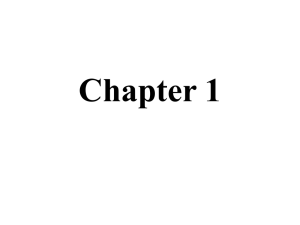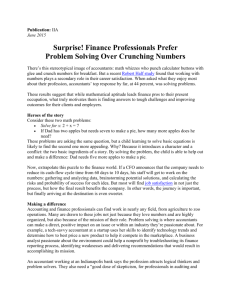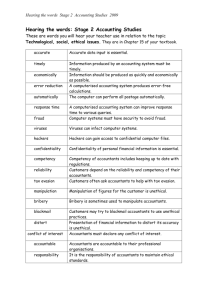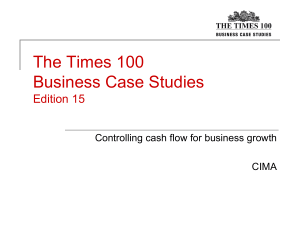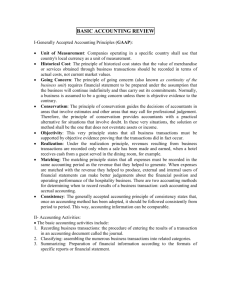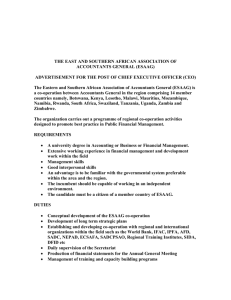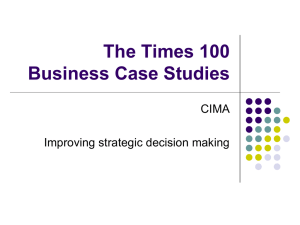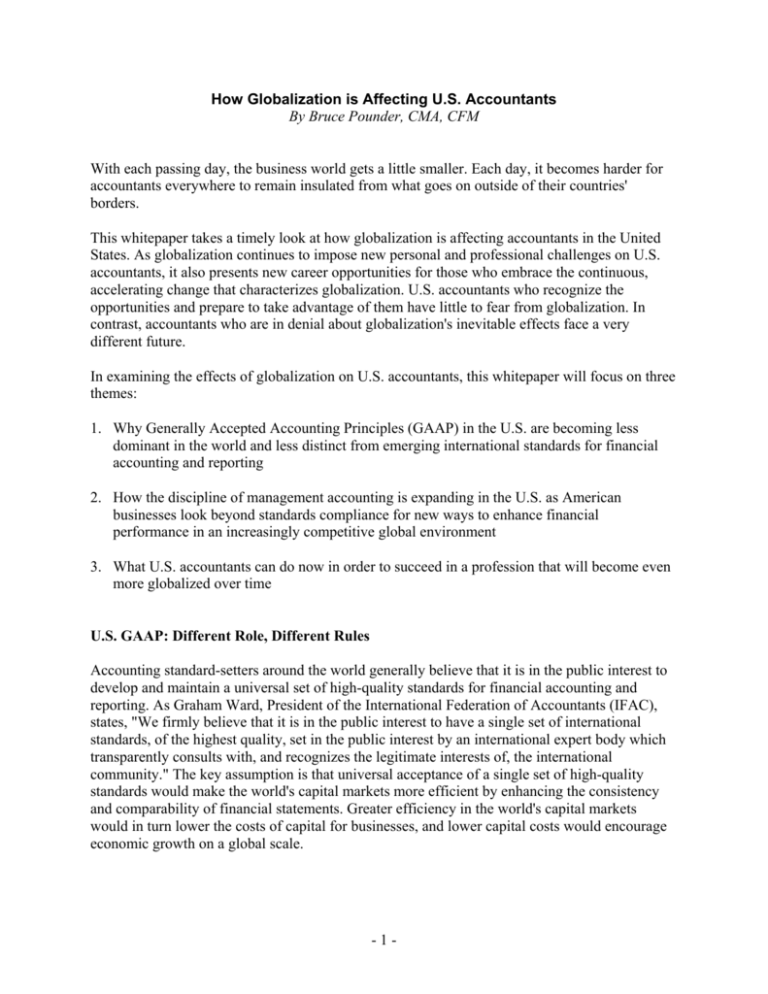
How Globalization is Affecting U.S. Accountants
By Bruce Pounder, CMA, CFM
With each passing day, the business world gets a little smaller. Each day, it becomes harder for
accountants everywhere to remain insulated from what goes on outside of their countries'
borders.
This whitepaper takes a timely look at how globalization is affecting accountants in the United
States. As globalization continues to impose new personal and professional challenges on U.S.
accountants, it also presents new career opportunities for those who embrace the continuous,
accelerating change that characterizes globalization. U.S. accountants who recognize the
opportunities and prepare to take advantage of them have little to fear from globalization. In
contrast, accountants who are in denial about globalization's inevitable effects face a very
different future.
In examining the effects of globalization on U.S. accountants, this whitepaper will focus on three
themes:
1. Why Generally Accepted Accounting Principles (GAAP) in the U.S. are becoming less
dominant in the world and less distinct from emerging international standards for financial
accounting and reporting
2. How the discipline of management accounting is expanding in the U.S. as American
businesses look beyond standards compliance for new ways to enhance financial
performance in an increasingly competitive global environment
3. What U.S. accountants can do now in order to succeed in a profession that will become even
more globalized over time
U.S. GAAP: Different Role, Different Rules
Accounting standard-setters around the world generally believe that it is in the public interest to
develop and maintain a universal set of high-quality standards for financial accounting and
reporting. As Graham Ward, President of the International Federation of Accountants (IFAC),
states, "We firmly believe that it is in the public interest to have a single set of international
standards, of the highest quality, set in the public interest by an international expert body which
transparently consults with, and recognizes the legitimate interests of, the international
community." The key assumption is that universal acceptance of a single set of high-quality
standards would make the world's capital markets more efficient by enhancing the consistency
and comparability of financial statements. Greater efficiency in the world's capital markets
would in turn lower the costs of capital for businesses, and lower capital costs would encourage
economic growth on a global scale.
-1-
Historically, U.S. GAAP has been regarded as being the highest-quality set of financial
accounting and reporting standards in the world. But its acceptance is far from universal, and its
standards have been slow to evolve and improve as the business world has become increasingly
complex and globalized. Consequently, it became possible for alternative standards to emerge
and assume a level of importance that is likely to surpass that traditionally accorded to U.S.
GAAP.
Specifically, compliance with the International Financial Reporting Standards (IFRSs)
promulgated by the International Accounting Standards Board (IASB) is now (or is scheduled to
be) required of publicly-traded companies in most countries. While there are many similarities
between international standards and U.S. GAAP, significant differences do exist, and today, U.S.
standards are not automatically presumed to be "better." This situation has affected the process
by which both U.S. and international standards are developed and maintained, and has already
resulted in changes to both U.S. and international standards.
According to IASB Chairman Sir David Tweedie, "[IFRSs] are now used by 100 countries
throughout the world. Within the next five years we expect the accounting standards of major
economies such as those of Japan, Canada, China and India to converge with IFRSs while at the
same time the differences between international standards and U.S. GAAP are being eliminated."
Since 1973, private-sector financial accounting and reporting standards in the U.S. have been
developed and maintained primarily by the Financial Accounting Standards Board (FASB). In
October 2002, the FASB and the IASB jointly issued of a memorandum of understanding known
as the "Norwalk Agreement", marking a significant step toward formalizing their commitment to
the convergence of U.S. and international accounting standards. As a result of the Norwalk
Agreement, the FASB undertook several key initiatives to further the goal of convergence of
U.S. GAAP with IFRS. For example, recent FASB pronouncements have updated rules
concerning inventory costs, exchanges of nonmonetary assets, and accounting changes and error
corrections, primarily to achieve convergence with IASB standards.
In February, 2006, the FASB and IASB published a Memorandum of Understanding (MOU) that
reaffirmed the two boards' shared objective of developing high quality, common accounting
standards for use in the world’s capital markets. The MOU is a further elaboration of the
objectives and principles first described in the boards' Norwalk Agreement. It contains a
"roadmap" that identifies several short- and long-term convergence topics that are expected to
result in the creation of new, improved, converged standards by both boards.
Most significantly, the MOU incorporates a commitment by both boards to take the necessary
steps that would encourage the U.S. Securities and Exchange Commission (SEC) to eliminate the
requirement for public, non-U.S. companies that are registered with the SEC and that prepare
financial statements under IFRS to reconcile those statements to U.S. GAAP. The elimination of
that requirement would represent a milestone in U.S. recognition of the quality that international
accounting standards have attained, and is expected to take place by 2008.
IASB Chairman Tweedie offers some additional insight as to what lies further down the road: "It
is expected by about 2012 someone using international standards or U.S. GAAP will get broadly
-2-
the same results in their financial statements. This will be done not simply by eliminating
differences in present standards but, where IASB and FASB standards are outdated and overly
complicated, by the issuing of new, joint standards. The aim of one set of high quality global
standards will hopefully be achieved in the next few years."
There are three key implications of this situation for U.S. accountants. First, the rules of U.S.
GAAP have changed and will continue to change so as to converge with international standards.
Second, international accounting standards will become increasingly relevant – and U.S. GAAP
decreasingly relevant – to companies in the U.S. and throughout the world. Third, and most
importantly, U.S. accountants will find themselves at a severe disadvantage to the many foreign
accounting professionals who have already mastered international accounting standards and who
are therefore much better-positioned to take advantage of rapidly growing career opportunities in
China, India, and other emerging economies. In contrast to their foreign counterparts, "U.S.
accountants and their organizations have been much more blasé and almost uninterested" in
mastering international accounting standards, as Rice University professor Stephen A. Zeff has
observed.
And so, as international accounting standards have begun to overshadow U.S. standards in
significance, most U.S. accountants will find that their knowledge, skills, and abilities are
obsolescing faster than ever before.
Management Accounting: A Necessary Discipline in a Competitive World
While the effects of global accounting standards convergence are quite significant, they are
certainly not the only effects of globalization on U.S. accountants. Globalization is also changing
the balance among the multiple disciplines within the accounting profession, particularly in
America.
Traditionally, the accounting profession in the United States has been focused on the preparation
and auditing of financial accounting statements. When most Americans think of "accountants,"
they think of CPAs and other practitioners of financial accounting. Yet outside of the United
States, the discipline of management accounting has been well recognized as an important
segment of the accounting profession, much more so than it has within the U.S. There are
significant implications of this situation for U.S. accountants, but before addressing those
implications, it is important to distinguish management accounting from financial accounting.
Here are some of the many ways in which the two disciplines differ . . .
First, management accounting deals with both financial and non-financial data to support a wide
range of managerial decisions in contrast to financial accounting's focus solely on financial data
to support investors' and creditors' capital allocation decisions. "For many companies," notes
CareerBank.com CFO Douglas Banister, "the real value-add is the integration of financial
reporting with operational information."
Second, management accounting looks forward as well as backward, whereas financial
accounting is oriented solely towards history. Management accounting involves anticipating
-3-
what will, could, or should happen, as well as figuring out what did happen. Forecasting,
planning, and budgeting are typical management accounting activities.
Third, management accounting looks outward as well as inward, whereas financial accounting is
focused solely on what happens internally within an enterprise. Management accounting involves
proactively seeking and identifying opportunities and threats that an enterprise faces from
customers, competitors, suppliers, regulatory agencies, and other external parties.
In short, management accounting is focused on enhancing business performance in a competitive
environment, not simply on ensuring compliance with standards and regulations. But why has
management accounting as a professional discipline been overshadowed by financial accounting
and auditing in America? And how is globalization likely to raise its profile?
There are numerous reasons why management accounting has been practiced in relative
obscurity in this country. One is that for much of the 20th century, American businesses did not
need to pay much attention to their global competitiveness – through a combination of social,
political, and economic factors, American businesses faced little competition from abroad. But
by the 1980s, American industry was at a severe disadvantage to foreign enterprises that had for
decades been enhancing their competitiveness out of necessity.
Another reason for management accounting's low profile in the U.S. is that the typical American
style of management is less information-centric and less team-centric. American managers are
more likely to make decisions on the basis of "gut feel" or with an eye towards personal
enrichment rather than on the basis of formal analysis and mutual shared commitment to
maximizing competitiveness.
So many of the present economic challenges the U.S. faces today which appear to be threats
from abroad are in fact largely due to our own managerial shortcomings. We know that foreign
enterprises rely more heavily on management accounting to succeed in global markets; American
businesses are just now beginning to value the contributions of accountants who are more than
just scorekeepers and who are instead true business partners.
In this time of increased pressure on American companies to improve their financial performance
in the face of global competition, the time is right for management accounting professionals to
step out of the shadows of their financial accounting colleagues. Management accountants want
to contribute directly to the creation of value, not merely to protect and preserve it. Of course, the
accounting profession needs both perspectives, and U.S. businesses will benefit greatly as they
continue to build a healthier balance between the two.
Fortunately, U.S. accountants don't have to "choose" between financial accounting and
management accounting in order to succeed in our increasingly globalized world. Highly
successful accountants understand and practice both. But since the knowledge, skills, and
abilities (KSAs) of most U.S. accountants now are heavily biased towards financial accounting,
most U.S. accountants will need to work at adding to management accounting KSAs in a way
that will help their clients and employers better meet the challenges of global competition.
-4-
Looking Ahead: Threats and Opportunities for U.S. Accountants
Which U.S. accounting professionals are most likely to be affected adversely by globalization?
The three groups at greatest risk are:
•
Accountants working for (or providing outside services to) foreign-owned SEC registrants
•
Accountants working for (or providing outside services to) U.S.-based enterprises that are
expanding internationally
•
Accountants whose knowledge, skills, and abilities (KSAs) limit them to performing only
low-value, compliance-oriented work
The first two groups should be concerned due to the decreasing relevance of KSAs based solely
on U.S. GAAP. Professor Zeff notes that today's accountants need to know "how to read,
understand and compare IASB-based financial statements with U.S. GAAP financial
statements."
The third group is at risk of losing their jobs to offshore outsourcing or to U.S. colleagues who
have additional management accounting talents that help their employers/clients match the
talents available to foreign competitors.
Which U.S. accounting professionals are most likely to benefit from increased globalization?
The two groups that will have the best and most career opportunities are:
•
Accountants who expand their financial accounting KSAs so as to gain mastery of changing
U.S. and international accounting standards
•
Accountants who complement their compliance-oriented KSAs in financial accounting with
the performance-oriented KSAs of management accounting
U.S. accountants in these groups will be able maximize their career opportunities both in the
U.S. and abroad. For example, Big 4 accounting firms (like PricewaterhouseCoopers which
currently operates in 144 countries) require KSAs that extend far beyond those based on U.S.
financial accounting standards.
What can accountants do to migrate away from the at-risk groups and position themselves to take
advantage of the opportunities that globalization is creating? It all boils down to enhancing your
KSAs and credentials. Lifelong learning is not merely desirable, it is essential for career success
in an increasingly globalized world. And globally-recognized credentials like the Certified
Management Accountant (CMA) and Certified Internal Auditor (CIA) designations make
excellent complements to localized credentials like the CPA designation.
Where can you start your path to learning? Of course, the Internet is a key source of information.
Deloitte Touche Tohmatsu maintains what is perhaps the Web's best free resource on IFRSs. The
-5-
IFAC also offers numerous guidance materials and publications that can be downloaded free of
charge from their online bookstore. And it is getting easier to find relevant Continuing
Professional Education (CPE) seminars online, thanks to innovative CPE providers like
Leveraged Logic, whose "This Week in Accounting" online seminar series frequently focuses on
international accounting issues.
Various professional associations have begun to address the growing needs of accountants in
international matters. For example, the North Carolina Association of CPAs has an International
Practice Committee which helps member CPAs (1) become conversant in global business
practices and strategies so they may better advise their clients in these areas; and (2) provide
services in the international arena such as cross-border tax planning, multinational company
mergers, joint ventures, etc. Also, the New York State Society of CPAs has an International
Accounting and Auditing Committee as well as an International Taxation Committee to similarly
assist their members. And for U.S. accounting professionals who want to be part of the shift
towards a better balance between financial accounting and management accounting in this
country, the Institute of Management Accountants (IMA) offers numerous educational and
networking resources as the Institute continues to forge partnerships with other communities of
management accountants around the world.
Summary
This whitepaper has examined the effects of globalization on U.S. accountants. As business
becomes increasingly globalized, there is clearly more pressure on U.S. accounting professionals
to expand and enhance their knowledge, skills, and abilities beyond what they are currently
likely to possess. More and better career opportunities await those who do.
The author wishes to thank Mr. Alfred M. King, Vice Chairman of Marshall & Stevens, for his
generous, helpful feedback on early drafts of this whitepaper.
Links to Resources
•
•
•
•
•
•
•
•
•
•
CareerBank.com: http://www.CareerBank.com
Deloitte Touche Tohmatsu's "IAS PLUS" website: http://www.iasplus.com
Financial Accounting Standards Board (FASB): http://www.fasb.org
Institute of Management Accountants (IMA): http://www.imanet.org
International Accounting Standards Board (IASB): http://www.iasb.org
International Federation of Accountants (IFAC): http://www.ifac.org
New York State Society of CPAs (NYSSCPA): http://www.nysscpa.org
North Carolina Association of CPAs (NCACPA): http://www.ncacpa.org
"This Week in Accounting" live online seminars: http://www.LeveragedLogic.com/TWinA
U.S. Securities and Exchange Commission (SEC): http://www.sec.gov
-6-
ABOUT THE AUTHOR
Bruce Pounder is president of Leveraged Logic, a leader in the development, marketing, and
delivery of professional education. Since 1988, Bruce has presented Continuing Professional
Education (CPE) seminars to thousands of CPAs and other financial professionals around the
world. Currently, Bruce hosts "This Week in Accounting," an online CPE seminar series
conducted live in the CPEanywhere Virtual Classroom. He also writes technical and careeroriented articles that regularly appear in the journals and newsletters of dozens of professional
associations.
Bruce is a Certified Financial Manager (CFM) and a Certified Management Accountant (CMA).
In 2004, he earned the Johnson & Johnson Gold Medal for attaining the highest score in the
world on the CFM examination, and the Procter & Gamble Silver Medal for attaining the second
highest score on the CMA examination. Bruce also holds a Bachelor's degree from Syracuse
University and an MBA from Rice University.
Bruce can be reached by phone at (828) 254-4812 or by e-mail at
bpounder@LeveragedLogic.com.
Copyright © 2006 Leveraged Logic, All Rights Reserved
-7-

